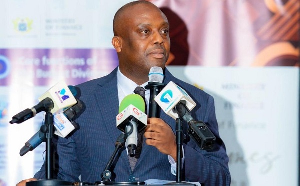A National Policy dialogue on the impact of mining operations on the environment, communities’ access to land and agricultural productivity has been held in Accra.
The day’s meeting, aimed at deliberating on the access to agricultural lands, the impacts of minerals in water bodies and challenges on communities, saw participants developing pragmatic measures as a way forward in dealing with the canker of mining activities.
Organised by Civil Society Coalition on Land (CICOL), the meeting brought together stakeholders from the Minerals Commission, Ministry of Lands, Civil Society Organization, non-governmental organisations and individuals across the regions to share and exchange ideas towards the review of the Mining Act.
Speaking on the theme: “Impact of Mining Operations on the Livelihoods and Socio-economic wellbeing of Resettled Host Communities in the Western Region,” Mrs Lillian Bruce, Co-ordinator, CICOL, explained that the dialogue was a follow-up initiative on a sensitisation workshop held in Tarkwa in the Western Region earlier this month.
She said as a way of developing requisite measures to help bridge the gap created by mining operations in the Western Region, there was the need to access the impact it had on citizens as well as their knowledge on the mining laws.
Mrs Bruce said as part of CICOL’s efforts in addressing the problems with the mining operations, an evaluation exercise was carried out in three districts of Tarkwa because of the resettled communities in the region.
She said during the exercise it was revealed that about 70 per cent of the people in the region were found to be farmers who had lost their lands as a result of concession activities which had made farming unattractive and impacting on their livelihood and employment.
“We also found out that there were no access to potable water, and in cases where they were, they did not taste good, it was colourless and very hard to work with,” she said.
Mrs Bruce said the community members had no hope, knowledge, education and ideas about compensation of lands, adding; “community members disclosed that resettlement had brought hunger to them and impacting negatively on their livelihood as well as employment.”
She, therefore, reiterated the community members call on the Government for shared scheme technologies and increased farm scheme to help them make more yields.
“Government needs to provide us with adequate public education, sensitisation and equipment of regulatory commission,” she said.
“There should also be the abolishment of surface mining for underground mining to be much more lucrative to investors and the establishment of environmental courts to help solve our predicament,” Mrs Bruce said.
Mrs Dela Obeng-Sakyi, Principal Legal Officer, Minerals Commission, said previously there were inadequate compensation laws but in June 2012 there was an amendment in the mining operations Act that were now addressing compensation, delayed payments, increased project cost, project delay and property loss to citizens, institutions and other personnel in the mining activities.
“Subject to section 73 and 74 of the mining operations Act, there have been regulations such as claims for compensation, negotiations, assessments and payments in the promotion of better dealing in the mining sector,” she said.
Mrs Obeng-Sakyi said there had also been the involvement of many resourced people as well as new laws to hopefully solve problems being faced by people at the grassroots.
She, however, called for adequate education to help boost the knowledge of not only CICOL but the public at large in mining and its operational acts.
Alhaji H. J. Baryeh, Technical Director, Ministry of Lands and Natural Resources, said over the years there had been collaborative efforts between the Ministry and CICOL at addressing the dangers mining activities posed to lands in the country.
He said land issues could not be overlooked especially as the African Union had put land issues at the far front with Ghana going to be the first country to host a conference on land.
He expressed the Ministry’s readiness to work with CICOL and all stakeholders on eliminating the cankers befalling the country through the activities of mining.
Mrs Christie Esi Bobobee, Administrator of Stool Lands, Ghana, hailed CICOL for the move saying it was timely and a good platform to actively improve the best ways of mining in the country.
She said much benefits were derived from mining when done accurately and, therefore, the Stool Lands had a similar mandate with CICOL to work between the agencies, public and non-public institutions in the area of lands.
Participants expressed their happiness in the knowledge and education acquired and called for awareness creation and sensitisation programmes in all the 10 regions of to help position Ghana’s mining sector on the global market.
Business News of Thursday, 31 July 2014
Source: GNA












